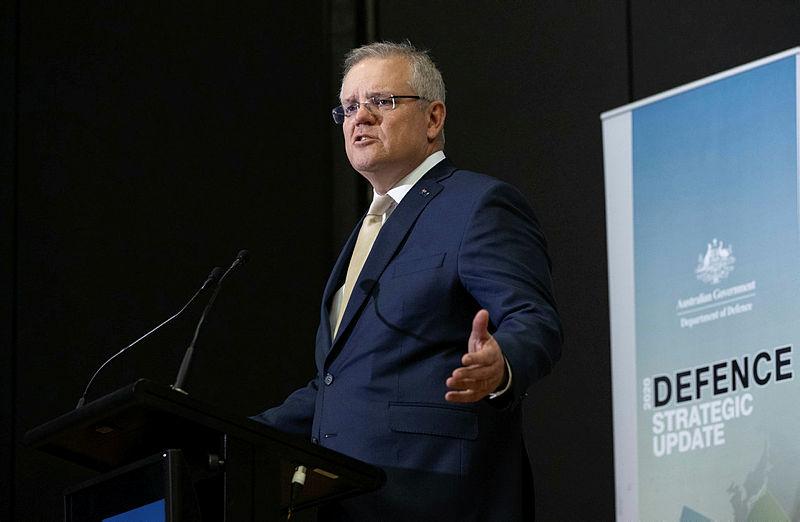Australia’s new defence paradigm
Posted By Geoffrey Barker on July 7, 2020 @ 06:00

Occasionally Australian strategic defence policy has moments of enlightenment when it breaks free from the evasions, platitudes and niceties of normal diplomatic discourse.
Such a moment occurred last week when Prime Minister Scott Morrison released the defence strategic update and force structure plan [1]. Prompted mainly by China’s increasingly coercive international behaviour, the revised defence policy proposes a notably more rigorous framework to protect Australian interests and to assist global responses to Beijing’s rising brutality.
It is, as others have noted, a pivotal moment in modern Australian military history. The new policy marks an unambiguous return to the defence-of-Australia policy articulated by Paul Dibb in the 1986 defence review [2]. It declares Australia’s intention to acquire major new offensive military capabilities and to use them to put the forces and infrastructure of potential adversaries ‘at risk from a greater distance and therefore influence their calculus of costs involved in threatening Australia’s interests’. That is an essential element of a sustainable defence policy.
Particularly impressive is the clear alignment and logical consistency between the revised strategic appreciation and the planned 10-year, $270-billion investment program, which includes long-range (possibly hypersonic) missiles, to improve the lethality of the Australian Defence Force.
Too often in the past, bold strategy assessments haven’t been matched by appropriate spending and acquisition decisions. No longer: this force structure plan, which includes ‘offensive’ cyberspace capabilities, and a boosted Jindalee over-the-horizon radar, will concentrate minds in Beijing and reassure allies.
The new policy recognises and responds to the rapid deterioration in Australia’s strategic environment in recent years. It abandons the dated assumption of 10-year strategic warning time ahead of any major conflict and it calls out China’s so-called grey-zone activities. Australia has now declared its willingness to confront and to deter Chinese militarisation of the South China Sea, its corrupt interference in Australian life, its disinformation campaigns and its economic coercion. Morrison deserves praise for his courageous stand.
Australia’s defence policy has emerged from what has been a crisis in strategic policy: the old, familiar strategic paradigm was no longer adequately addressing problems emerging from China’s expansionism and its contempt for the global order. As Thomas S. Kuhn [3] argued in his magisterial 1961 The structure of scientific revolutions, this sort of crisis ‘loosens the rules of normal puzzle-solving in ways that ultimately permit a new paradigm to emerge’.
Of course, the new policy has evolved from earlier defence white papers and updates. But it just as clearly represents a new (or rediscovered) way of looking at the strategic order and finding policy and acquisition solutions that offer new ways of addressing China’s authoritarian arrogance. Again, as Kuhn notes, a crisis need not prompt puzzle-solvers to renounce an inadequate paradigm but to ‘devise numerous articulations and ad hoc modifications’ that enable problems to be handled more adroitly. That seems to be what the new defence policy has done.
But the new policy does raise serious questions. Dibb has already noted that Australia’s new submarines and frigates will not be delivered until the 2030s while the strategic threat is current and real. Can we risk the wait, or do we need to consider some interim capability solutions?
We can take some comfort that the much-maligned Collins-class submarines are only half-way through their lifecycles and will be equipped with more lethal armaments, but what will be the largest expansion of Australia’s navy since World War II is still a distant goal.
No less worrying is the possibility that Beijing might risk a military provocation or threaten coercive new economic actions to test Canberra’s resolve. Do we really have the courage to go to the brink with a huge and increasingly aggressive nuclear power in order to demonstrate that we are serious about defending our interests? And given our economic ties to China, what sacrifices would we be prepared to endure?
With the chaos engulfing Donald Trump’s administration, Australia can have at best qualified confidence in support from its US ally, especially if Trump is re-elected in November. We have to hope that China will conclude that any offensive action against Australia would cost far more than it would be worth.
Then there’s the heavy stress on the Australian defence industry in the new policy documents. Sadly, the Defence Department is littered with the remnants of high-minded and elegantly phrased defence industry policy statements that have vanished into the limbo of broken and forgotten dreams. The gap between aspiration and achievement in defence industry policy is indeed vast.
Finally, there’s the eternal money–politics problem: $575 billion over a decade is a huge financial commitment to defence. It might loom even larger as future Australian governments grapple with the debt mountain that will remain after the Covid-19 crises passes.
Will the commitment to defence funding remain solid when Canberra confronts huge post-Covid deficits? Or will future governments be tempted to take the easier path of cutting defence to pay for more popular domestic welfare programs?
Given the gravity of Australia’s strategic crisis, it would be tragic and foolhardy if a future government were to retreat from the new policy stance unless China’s behaviour unexpectedly moderated. We have the brave new paradigm; now we need the national courage and purpose to embrace and to employ it if needed.
Article printed from The Strategist: https://aspistrategist.ru
URL to article: /australias-new-defence-paradigm/
URLs in this post:
[1] defence strategic update and force structure plan: https://www.defence.gov.au/strategicupdate-2020/
[2] 1986 defence review: https://www.defence.gov.au/SPI/publications/defreview/1986/Review-of-Australias-Defence-Capabilities-1986.pdf
[3] Thomas S. Kuhn: https://plato.stanford.edu/entries/thomas-kuhn/
Click here to print.